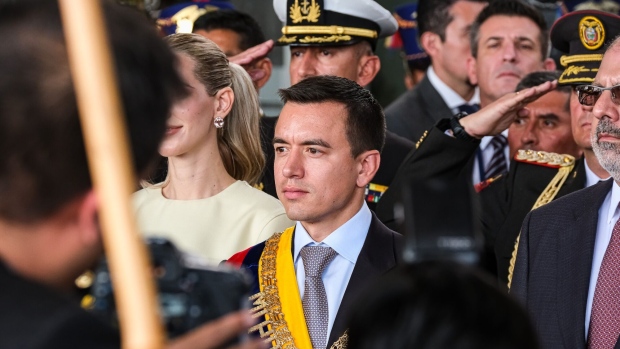Jan 13, 2024
Ecuador’s President Leverages Narco War to Push Overdue Reforms
, Bloomberg News

(Bloomberg) -- As Ecuador fights to contain violent gangs, President Daniel Noboa is making a patriotic appeal to citizens to bear part of the cost.
“This war is all of ours and we all have to fight to end these terrorist groups and return peace and progress to the country,” he said Friday during a visit to the Guayaquil station of state broadcaster TC Television, where armed thugs held media staffers hostage on air this week until they were rescued by police commandos.
Hours earlier, the 36-year-old president submitted a bill to the National Assembly that would increase the value-added tax to 15% from 12%.
Unlike Javier Milei in Argentina, Noboa campaigned on a platform of avoiding hardship even as a ballooning budget deficit and lack of a clear plan kept Ecuador’s bonds deep in distressed territory. After declaring 22 gangs military targets as the homicide rate soars, he appears to have changed tack.
On Tuesday, he unveiled plans to ask voters to approve temporary labor contracts and international arbitration in a referendum — political red flags for Ecuador’s powerful left-wing parties and Indigenous organizations.
More reforms are in the works, including deep cuts to the country’s bureaucracy, according to Trade and Production Minister Sonsoles Garcia. “We will carry out an important restructuring of our organizational charts and in the short term we will significantly reduce the size of the state,” she said Friday in a statement.
In a recent interview, Finance Minister Juan Carlos Vega said the constitution and strict labor laws threaten to make it difficult to make other changes quickly.
He plans to cancel temporary government labor contracts signed in 2023 and cut wasteful spending at state-owned companies, which lack audited books, to save about 2% of gross domestic product. The aim is to use those moves as proof of Ecuador’s willingness to do what’s necessary in a pitch to multilateral lenders this month.
The planned tax hike will help convince the International Monetary Fund to lend again, Simon Cueva, a former finance minister and IMF representative to Bolivia, said by email. Fiscally and socially, Ecuador’s value-added levy “is low compared with the region, has a high efficiency in collection and it’s much less regressive than in other countries” thanks to a lot of exemptions, he added.
Noboa, who’s scrapped plans to attend the World Economic Forum in Davos, needs a swift deal because the IMF won’t negotiate aid amid an electoral campaign that is slated to start later this year. Elected after his predecessor Guillermo Lasso closed congress, triggering a special election, the president’s term ends in May 2025.
‘A Barbarity’
Hours after submitting the fast-track bill, Noboa, an heir to a banana fortune who has enjoyed overwhelming legislative support, faced headwinds from Ecuador’s congress. The main political parties that have so far voted with his National Democratic Action, which holds just 10% of seats, balked at the proposal.
“We won’t accept this. It’s a barbarity,” former President Rafael Correa, who leads the Citizen Revolution party and is in self-imposed exile due to a corruption conviction, said on social media. Noboa’s other erstwhile parliamentary ally, the Social Christian Party, also said it wouldn’t vote in favor of a VAT increase or any new tax.
Under fast-track rules, already applied twice since he took office, the legislature has 30 days to approve or modify the tax bill or it becomes law as submitted. If approved, it will go into effect March 1 and provide $1 billion this year and $1.3 billion thereafter, according to the finance ministry.
While Noboa appears to have the best intentions, “what’s lacking a little bit is sophistication in dealing with congress and in terms of what he can and can’t do,” Cathy Hepworth, head of emerging-market debt at PGIM Fixed Income, said in an interview.
Ecuador sovereign bonds rallied Friday, adding to a modest rally that began in mid-December. Notes due in 2040 jumped 1.6 cents to more than 34 cents on the dollar, according to indicative pricing collected by Bloomberg.
Citing the government’s declaration of war on the cartels, S&P Global Ratings moved in line with other ratings agencies to put Ecuador’s debt on negative watch on Thursday, arguing this week’s outbreak of violence could hamper the president’s reform push.
Read more: Why Ecuador Is Erupting With Narco Gang Violence: QuickTake
Much of Ecuador has nonetheless returned to a tense calm, with many stores and offices reopening. Schools, however, remained closed through Friday, shifting to remote teaching as they did during the Covid-19 pandemic. The Education Ministry announced Friday that schools will stay closed until Jan. 17.
Police and soldiers carried out large-scale raids in particularly violent cities including Guayaquil, Esmeraldas and Duran. They arrested hundreds of suspected “terrorists,” as alleged gang members are now called.
Standoffs at several prisons where inmates are holding more than 150 staff hostage continue. The Red Cross has brokered the release of just three people since the crisis began as police and military avoid assaults that could see a repeat of prison clashes that have claimed more than 400 lives since early 2021.
That cautious approach may also help the government’s pitch to investors and multilateral lenders.
“This sort of criminal activity, if on a large scale, could disrupt economic activity for a few days — but it’s really unlikely that this would completely derail the economy,” according to Carlos de Sousa, portfolio manager at Vontobel Asset Management.
--With assistance from Maria Elena Vizcaino and Ezra Fieser.
©2024 Bloomberg L.P.








